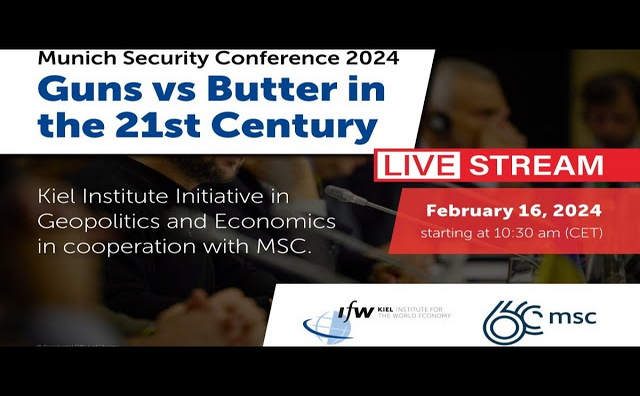Munich Security Conference 2024
A Debate on Guns vs Butter
The Kiel Institute is hosting a MSC Conversation on the "guns versus butter" question at the Munich Security Conference 2024.
Panelists
- Niall Ferguson, Senior Fellow, Hoover Institution, Stanford University; Founder and Managing Director, Greenmantle LLC
- Evika Siliņa, Prime Minister of Latvia
- Norbert Röttgen, Member of the Foreign Affairs Committee of the German Bundestag
Initial input:
- Christoph Trebesch, Professor at the Kiel Institute
Moderator:
- Moritz Schularick, President of the Kiel Institute
This conversation poses the “guns versus butter” question for the 21st century. How much will European governments have to spend on the military in the coming years and where will the money come from? Is Europe prepared for the hard choices between “guns” and “butter” that are lurking on the horizon? Security threats to Europe have grown substantially, but policymakers appear to have little fiscal capacity to respond.
With the pressure of aging populations, high levels of public debt, and much-needed investments for the climate transition, the hurdles for a military buildup appear high. Yet from a longer-term perspective, current levels of military spending in Europe are very low. Never before in modern history have democracies spent such a small share of their budget on weapons and armies. We will discuss the options to finance rearmament, whether in the form of spending cuts (threatening social stability), higher taxes (threatening economic dynamism and innovation), or increased debt (threatening debt sustainability). We will debate why some European NATO countries have shifted their budgetary priorities toward military spending and others have not. And we will distill the lessons of history to better prepare for the challenges ahead.
Research Note
Livestream Replay
A big picture view on “Guns vs. Butter, 1870–2022” (Marzian and Trebesch 2024)
The session will begin with a brief academic input on new research from the Kiel Institute (Marzian and Trebesch, 2024, "Budgets and Geopolitics"), as a factual backdrop for a "big picture" guns vs. butter debate. Figure 1 is the key chart, based on military and social spending data going back to the 19th century.
We live in an age of “butter” in the G7 countries (Canada, France, Germany, Italy, Japan, UK, US), as Figure 1 shows. On average, the share of military spending in government budgets has fallen to historic lows. At the same time, social spending (health, labor, welfare, education and social affairs) has grown steadily. These spending trends look similar when shown in percent of country GDP rather than as shares of budget.
The data also show a growing disconnect between military spending (at a historic low) and geopolitical risk (at a historic high), particularly in the case of Germany. This can be seen in Figure 2, which combines our data on budgetary spending with data on geopolitical risk from Caldara and Iacoviello (2022). Germany today faces exceptionally high geopolitical risk, at the level of the early 1960s. Compared to the 1960s, however, military spending is very low today, accounting for only about 10% of total spending or 5% of GDP. This is just about a third of what it was in the early 1960s. In sum, we live in dangerous times, but military budgets in the West have not responded to these developments.

